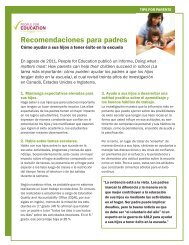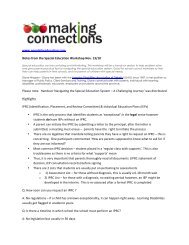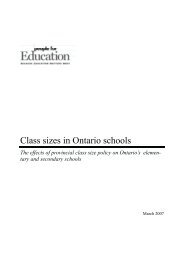Our Children Our Future Our Vision - People for Education
Our Children Our Future Our Vision - People for Education
Our Children Our Future Our Vision - People for Education
You also want an ePaper? Increase the reach of your titles
YUMPU automatically turns print PDFs into web optimized ePapers that Google loves.
<strong>Our</strong> <strong>Children</strong>, <strong>Our</strong> <strong>Future</strong>, <strong>Our</strong> <strong>Vision</strong><br />
(c) “Indian” <strong>Education</strong> Policy<br />
“As the federal government apologizes <strong>for</strong> residential schools and<br />
assimilation they should now step up and give it back to us. They<br />
took our languages and culture – they should help us get it back.<br />
That’s the logical thing to do.” (Councillor)<br />
Despite the solemn commitments made by both parties in the treaties which were meant to benefit<br />
our heirs and heirs <strong>for</strong>ever, we know that subsequent Crown-First Nation relations were based<br />
more on unilateral control and assimilation than on respect <strong>for</strong> the treaty promises made in good<br />
faith by the Indigenous Nations. What came to be known as “Indian policy” had a destructive effect<br />
not only on the lives of Indigenous peoples, but also on any relationship with the Crown that<br />
may have existed post-treaty negotiations. 51 The ongoing legacy of poverty, ill health, pre-mature<br />
deaths, and distrust can all be linked to federal Indian policy – both historic and contemporary. 52<br />
First Nation-Crown Relations have changed significantly since treaty days. What started out as<br />
Nation to Nation relations quickly changed to one where First Nations were treated as wards of the<br />
state. It is during this stage when First Nations were relocated from traditional territories, restricted<br />
to reserves, and federal laws were developed to control every aspect of their lives. 53 In fact, policy<br />
shifts which have had detrimental impacts on First Nations, have often been largely out of the control<br />
of First Nations. 54<br />
Early Indian policy is often said to have been based on the need to “protect” Indians, however, the<br />
idea was more about managing and separating Indians until they were ready <strong>for</strong> civilization and<br />
could be assimilated. Early colonial policy objectives were to secure lands and resources <strong>for</strong> settlement<br />
and to control trade networks. They based their policies on two problematic assumptions: (1)<br />
that Indians and their cultures were inferior and (2) that Indians were slowly dying off. 55 This meant<br />
that the policy responses were short term; provided minimal funding; and concentrated on controlling<br />
and dividing Nations, as well as separating them from the settler population until they were<br />
ready <strong>for</strong> assimilation. This was to take place through both voluntary and mandatory enfranchisement<br />
provisions <strong>for</strong> adults and by residential schools <strong>for</strong> children. 56<br />
Residential school policy was part of this assimilatory Indian policy. The residential school policy<br />
51 L. Upton, “The Origins of Canadian Indian Policy” (1973) 8:4 J. of Can. Stud. 51-60. See also: B. Titley, A Narrow <strong>Vision</strong>:<br />
Duncan Campbell Scott and the Administration of Indian Affairs in Canada (Vancouver: UBC Press, 1986) [Narrow<br />
<strong>Vision</strong>]. RCAP, supra note 6.<br />
52 P. Palmater, “Stretched Beyond Human Limits: Death by Poverty in First Nations” (2012) Can. Rev. Soc. Policy (in<br />
print) [Death by Poverty].<br />
53 RCAP, supra note 6. Founding <strong>People</strong>s, supra note 35.<br />
54 R. Gibbins, “Canadian Indian Policy: The Constitutional Trap” 1 (1984) C.J.N.S. 1-9 [Canadian Indian Policy] at 5. W.<br />
Moss, E. Gardner-O-Toole, Parliamentary Library, “Aboriginal <strong>People</strong>: History of Discriminatory Laws” (Ottawa: Government<br />
of Canada, 1991) [Discriminatory Laws]. D. McNab, “Herman Merrivale and Colonial Office Indian Policy in<br />
the Mid-Nineteenth Century”, online: .<br />
55 Death by Poverty, supra note 52.<br />
56 RCAP, supra note 6.<br />
Chiefs of Ontario<br />
12
















